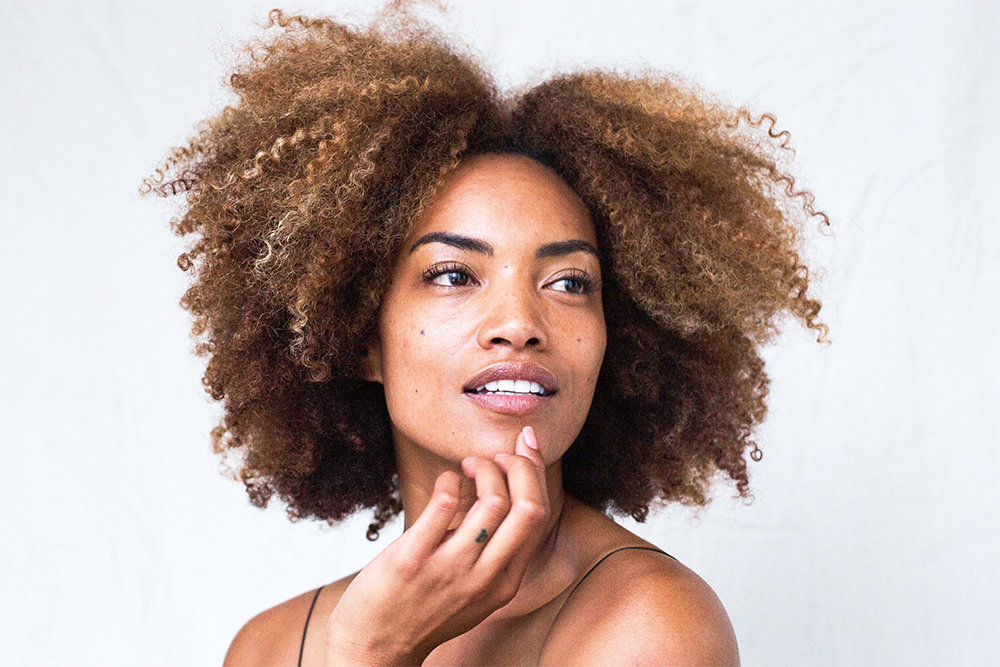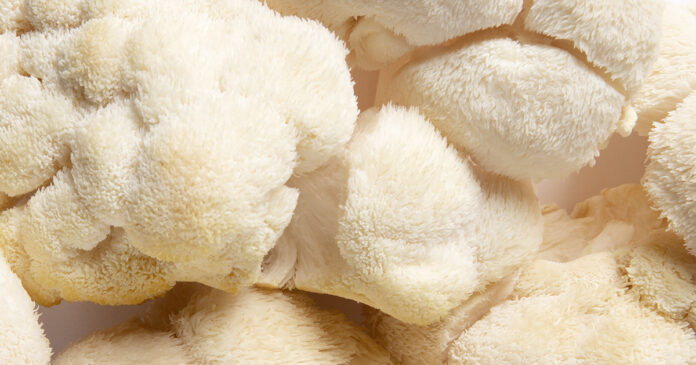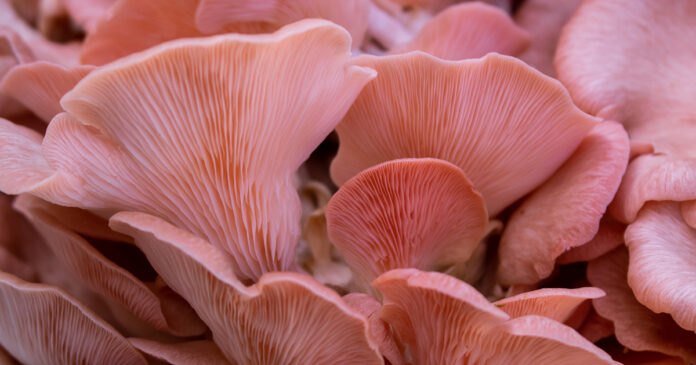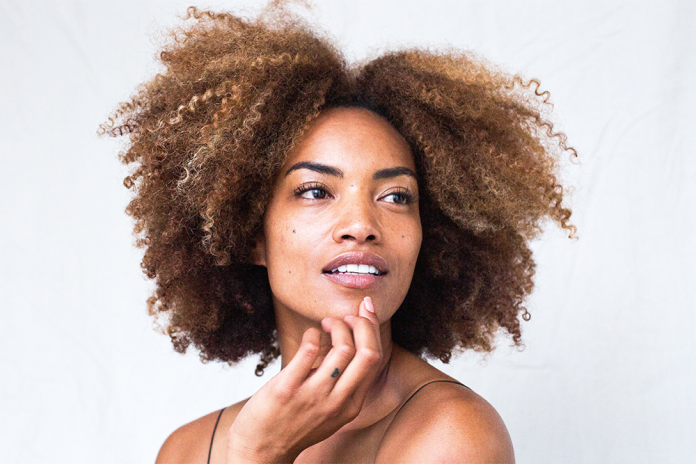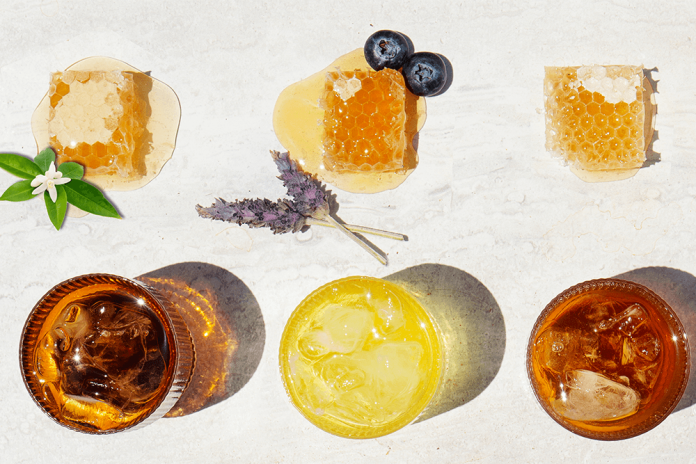Tea isn’t just delicious to drink. It also can provide a healthy boost to your skin and hair.
In fact, tea is a common ingredient in beauty products such as face lotions, eye creams and hair treatments.
For centuries, tea has been touted as a healthy beverage. But what can it do for your hair? And how should you use it? We’ve got answers!
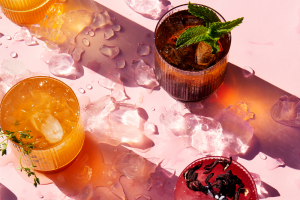
Does tea have health benefits for hair?
What’s good for your health is good for your hair, and tea is no exception.
Tea contains health-promoting antioxidants (specifically, a type called catechins) plus polyphenols — all of which support overall health, including vibrant skin and hair. (1, 2)
All of the antioxidants in tea help inhibit free radical formation — hopefully before cellular damage has occurred.
Understanding free radicals
Free radicals are unstable molecules that can damage cells in your body. As we are exposed to environmental stressors and as we age, our body slowly gets worse at fighting off free radicals.
A build-up of free radicals can cause oxidative stress, leading to degeneration that can cause a change in your hair texture, hair loss, or gray hair. (3)
That’s where tea steps in. Tea helps counteract oxidative stress and helps to maintain or improve the health of your scalp and hair. Similarly, some herbal teas support healthy hair.
How do you use tea for your hair?
The simplest way to incorporate tea into your health and beauty routine is to drink a fresh cup of tea regularly. Pay attention to the type and quality of the tea leaves you purchase, as that will affect your results.
You can also try a tea rinse for your hair. Make a large batch of strong tea (using multiple tea bags or sachets) and take it into the shower with you. Typically, tea rinses are left in for up to an hour before washing off.
Tea rinses can support strong, shiny hair, relieve an itchy scalp, and offer a natural way to slightly alter the color of your hair. (More details about which tea to use for which hair color further below!)
You could also look for tea-infused hair products such as shampoo, deep conditioner, or a hair mask. Or consider essential oils infused with tea.
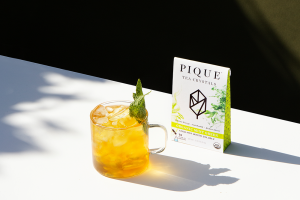
Which tea is best for hair growth?
Several types of tea can help stimulate hair growth and prevent breakage. In addition, tea can fight dryness and dandruff. Let’s take a look at a few types of tea and their benefits:
Green tea
The high level of antioxidants in green tea help fight off daily stressors, like UV rays, and can keep cells healthier for longer. Thanks to the epigallocatechin-3 gallate (EGCG), a type of catechin, green tea can help reduce dihydrotestosterone (DTH), a hormone that causes shedding and hair loss.
Green tea can also support increased blood (and nutrient) flow to hair follicles, keeping your hair in better condition. According to one study, EGCG helps stimulate healthy hair growth and helps prevent shedding. (4)
Black tea
Black tea contains multiple good-for-you nutrients and antioxidants such as flavonols, theaflavins, and catechins. (5) Since black tea is oxidized, it has fewer catechins than green tea, but it’s during the oxidation process that the unique theaflavins are formed.
The higher amount of caffeine in black tea can also help block DHT, possibly preventing hair loss.
While black tea is beneficial to drink and to use topically, hair rinses are the most popular use. Research has found that topical application of black tea can stimulate hair growth. (6) Rinses can also create more shine and give darker shades of hair a little color boost.
Nettle tea
Stinging nettle tea is also known for its hair-boosting attributes. Rinsing with nettle can minimize dandruff and helps with hair growth. Nettle is rich in silica and sulfur which helps keep hair shiny and healthy.
Iron, zinc and the many other vitamins that nettle contains make it a great tea to support your overall health, which translates to healthier hair.
More herbal teas for hair health
Lavender can soothe your scalp and aid in preventing hair loss.
Rosemary could increase blood flow to your scalp and can unclog hair follicles.
Peppermint can help calm your scalp and balance sebum production.
Chamomile tea soothes dry hair and an itchy scalp, and it could also have a brightening effect.
Ginger isn’t just for aiding digestion. It can help keep your hair strong, shiny, and flake-free.
Can tea rinses be used on any type and color of hair?
Tea rinses are safe to use on most hair types and colors, but you do want to choose your tea rinse based on your hair color, type of hair, and specific conditions you’re dealing with (dandruff, for example).
Blonde or red hair: Your best bet will be to use a lighter-colored tea such as white, green, nettle, or chamomile. These can help with hair and scalp health and accentuating golden tones in your hair. Hibiscus tea can bring out the best in red hair.
Brown hair: Just about any tea will work with dark hair shades. To cut down on hair shedding, try a black tea rinse. For an extra shine and hair health boost, try green or chamomile.
Natural hair: All of the above apply, or you could try a different tea rinse. Witch Hazel, for example, provides a deep cleanse for your hair and scalp.
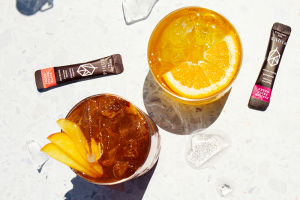
Are there any side effects?
Unless you have an allergy, tea and hair tea rinses should be safe for regular use. However, it never hurts to chat with your doctor if you have questions or concerns.
You will want to make sure you take caffeine content into account. Drinking black tea in the evening could keep you up all night!
Also keep in mind that a darker tea could have a temporary dye effect on lighter hair.
A Healthy Hair Treatment
Curious about incorporating tea into your hair care routine? If you’re a regular tea drinker, you can keep enjoying your tea(s) of choice. Or try incorporating a new type of tea or a tea rinse. Unless you’re specifically trying to color your hair with tea, tea rinses can be an occasional treat (although more often won’t hurt).
No matter how you decide to prepare your tea, it’s a great (and affordable) way to boost your hair health. Most teas are packed with nutrients that play an important role in maintaining your overall health, and in turn, the health of your hair.
